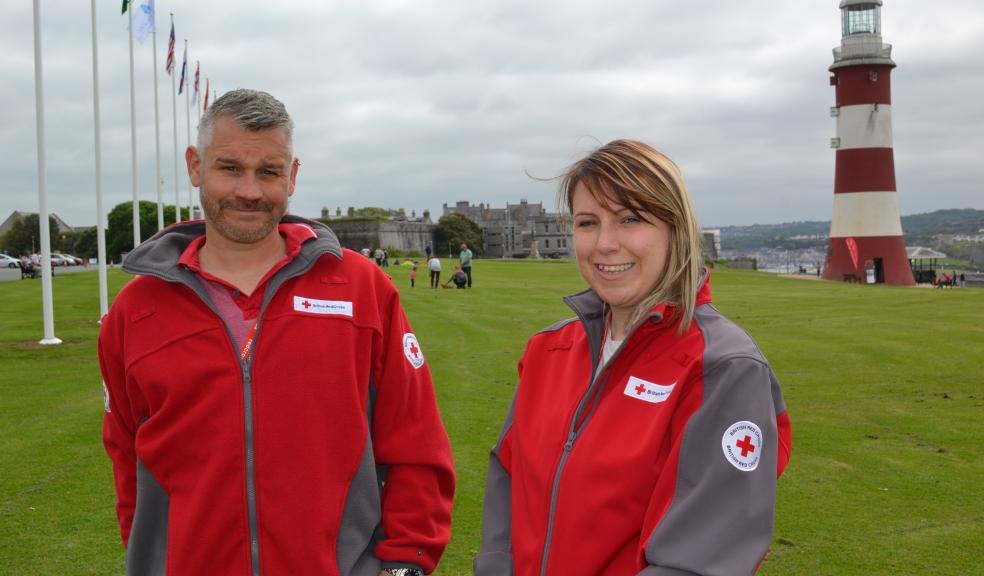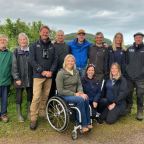
New British Red Cross team ready to respond after identifying Plymouth as one of the UK’s loneliest areas
The British Red Cross is this week launching a brand new service to tackle loneliness and social isolation in Plymouth. The charity is responding after finding that the city is one of 39 areas of the UK where help is needed most.
The Plymouth Community Connector service is one of 49 new schemes being introduced across the UK through the British Red Cross’ national partnership with the Co-op.
Matt Delaney, who has personal experience of loneliness (see below), is the new Community Connector for Plymouth and joins a national team of over 50 staff and 500 volunteers who will deliver the Red Cross’ new services. Matt and a team of volunteers will provide practical and emotional support to help people who are lonely and isolated connect with others in their communities. This will involve helping them to discover and access local activities and services and enjoy the benefits of being more involved in the area.
Matt explains his new role: “The Community Connector service will concentrate on Devonport and Plympton, which have been identified as having high levels of socially isolated people. We aim to reach all parts of the community by supporting anyone who may want to reconnect with people or who’d like to make a positive change in their lives.
“We are also looking for people who’d like to volunteer for the service. We often see a ripple effect where someone who has been helped will then go onto help someone else in similar situation. A small contribution can go on to have a big impact on a person’s life and on the wider community.”
The Red Cross is calling on local residents to support their community by giving a few hours a week to the new service, which over the next 18 months will provide vital support for around 200 adults of all ages who have no one to turn to.
A recent study by the Co-op and Red Cross revealed epidemic levels of loneliness and social isolation in the UK, with over nine million adults of all ages feeling always or often lonely. Changes common in many people’s lives – such as becoming a mother, getting divorced or separated, experiencing health and mobility issues, retiring or suffering bereavement – can be key triggers for loneliness.
The impacts can be as damaging to health as smoking and obesity, and have been estimated to cost the NHS and other public services up to £12,000 per person over the next 15 years.
In response, Co-op members and customers have now raised over £6 million to help tackle this serious and widespread issue.
More volunteers from Plymouth are needed to support the new service. Requiring a commitment of just a couple of hours a week, volunteer support will be invaluable in helping local people affected by loneliness feel more confident and able to reconnect with their community.
Matt says: “I’d encourage anyone to come forward and join us in tackling this hidden epidemic. By giving just a few hours a week you can make such a big difference, both to the lives of people affected and our community as a whole”.
For more information about volunteering, or to help someone affected by loneliness or social isolation receive support, contact the British Red Cross Plymouth Community Connector service at ConnectPlymouth@redcross.org.uk or call 01235 552 660.
MATT DELANEY’S STORY OF LONELINESS:
Matt Delaney, a 45 year-old ex-serviceman from Dartmoor, spent years dealing with the effects of social isolation after a severe injury left him immobile and housebound.
Matt explained: “The injury happened when I was 19 years-old and serving with the Grenadier Guards. We were on an operation and I was carrying a very heavy load. I jumped over a wall to get myself in a better position and completely shattered my left leg. It was broken in about 20 places. I was in and out of hospital for about 18 months undergoing numerous operations and rehabilitation.
“I left the army a few years later and took a job working with people with learning difficulties which I thoroughly enjoyed; but my ankle continued to cause me extreme discomfort. Eventually in 2012 I retired on ill health and I was told I’d need a below-the-knee amputation.”
For four years Matt was out of work and left with very limited mobility due to his injury. He became increasingly isolated as he was unable to do the things he had always enjoyed, such as walking and DIY.
Both his mental and physical health began to suffer. He struggled with bouts of depression and put on weight which affected his general health.
“It was a hideous time. Loneliness is very destructive. It affected my relationship with my wife, Michaela, and I didn’t see my friends. It changed how I felt about myself. I felt like my life was eroding away. I’d sit and watch the tele all day and over time that becomes normal. It’s not a very nice place to be.”
Luckily for Matt, his wife supported him, changing her job to allow her to be at home with him more and encouraging him to make small, positive changes to his life. He was fitted with a carbon fibre exoskeleton orthotic, which saved him from undergoing an amputation and allowed him to get mobile again. He also started taking evening classes to refresh his skills.
Last year, he returned to work supporting people in Devon suffering with long-term health conditions. When he saw a Community Connector service was launching in Plymouth he knew he could help.
He said: “Most people will have a link to loneliness – whether they’ve experienced it personally, or know a friend or family member who has been affected. Our research shows it is a crisis we cannot ignore, but I knew personally that a little proactive intervention can really maximise someone’s potential to achieve great things.
“I’m very passionate about this service and my personal experience has given me a great insight into how we can try to solve the problem of loneliness.”











